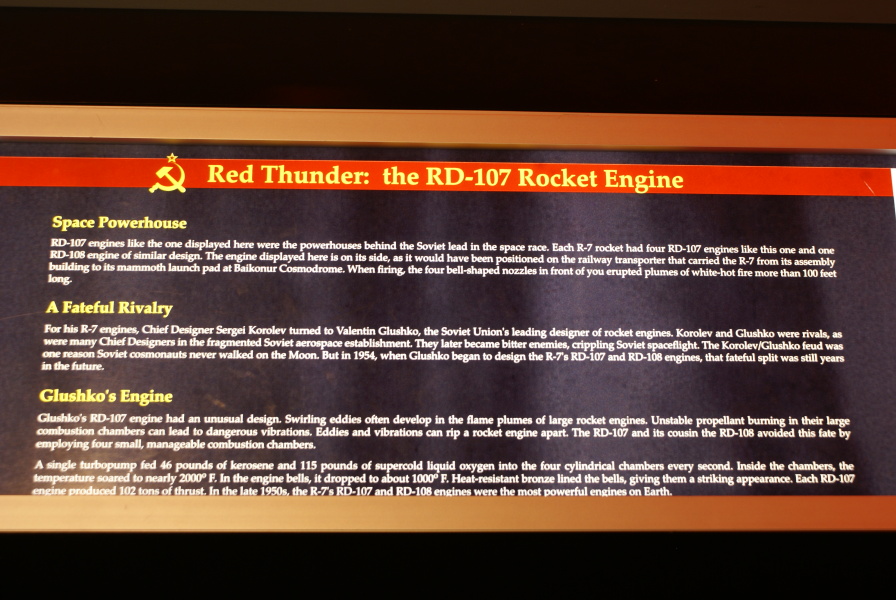| Prev |
heroicrelics.org Kansas Cosmosphere Site Index RD-107 Engine Gallery |
Next |
dsca0368.jpg
One of the signs accompanying the engine. It reads
Red Thunder: the RD-107 Rocket Engine
Space Powerhouse
RD-107 engines like the one displayed here were the powerhouses behind the Soviet lead in the space race. Each R-7 rocket had four RD-107 engines like this one and one RD-108 engine of similar design. The engine displayed here is on its side, as it would have been positioned on the railway transporter that carried the R-7 from its assembly building to its mammoth launch pad at Baikonur Cosmodrome. When firing, the four bell-shaped nozzles in front of you erupted plumes of white-hot fire more than 100 feet long.
A Fateful Rivalry
For his R-7 engines, Chief Designer Sergei Korolev turned to Valentin Glushko, the Soviet Union's leading designer of rocket engines. Korolev and Glushko were rivals, as were many Chief Designers in the fragmented Soviet aerospace establishment. They later became bitter enemies, crippling Soviet spaceflight. The Korolev/Glushko feud was one reason Soviet cosmonauts never walked on the Moon. But in 1954, when Glushko began to design the R-7's RD-107 and RD-108 engines, that fateful split was still years in the future.
Glushko's Engine
Glushko's RD-107 engine had an unusual design. Swirling eddies often develop in the flame plumes of large rocket engines. Unstable propellant burning in their large combustion chambers can lead to dangerous vibrations. Eddies and vibrations can rip a rocket engine apart. The RD-107 and its cousin the RD-108 avoided this fat by employing four small, manageable combustion chambers.
A single turbopump fed 46 pounds of kerosene and 115 pounds of supercold liquid oxygen into the four cylindrical chambers every second. Inside the chambers, the temperature soared to nearly 2000° F. In the engine bells, it dropped to about 1000° F. Heat-resistant bronze lined the bells, giving them a striking appearance. Each RD-107 engine produced 102 tons of thrust. In the late 1950s, the R-7's RD-107 and RD-108 engines were the most powerful engines on Earth.

| Time picture taken | Sat Dec 7 11:13:04 2013 |
| Location picture taken |
Outside the Blockhouse Gallery Hall of Space Kansas Cosmosphere Hutchinson, KS |
| Prev |
heroicrelics.org Kansas Cosmosphere Site Index RD-107 Engine Gallery |
Next |